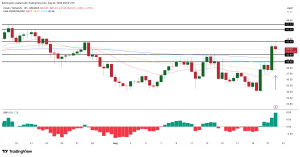4,000 Institutional Funds in Germany Can Now Invest 20% of Portfolios in Crypto Assets – Regulation Bitcoin News

Around 4,000 institutional funds with almost 2 trillion euros in assets under management in Germany can now invest 20% of their portfolios in cryptocurrency, including bitcoin.
The highly anticipated Fund Location Act (Fondsstandortgesetz) went into effect on July 1 in Germany. The German federal parliament, the Bundestag, cleared the legislation on April 22.
Under this law, new and existing domestic special funds (Spezialfonds) are permitted to invest up to 20% of their portfolios in crypto assets, like bitcoin.
There are approximately 4,000 such special funds covered by this legislation. According to a report by BVI Investments, 1.88 trillion euros ($2.23 trillion) were invested in open special funds, excluding special real estate funds, as of the end of December 2020.
If all special funds were to allocate the full 20% in cryptocurrency, it would equate to more than 376 billion euros ($446 billion).
Traditionally, special funds are open-ended, regulated investment funds limited to institutional investors, such as financial institutions, insurance companies, corporations, foundations, and churches.
What do you think about this law allowing special institutional funds to invest in cryptocurrency? Let us know in the comments section below.
Image Credits: Shutterstock, Pixabay, Wiki Commons
Disclaimer: This article is for informational purposes only. It is not a direct offer or solicitation of an offer to buy or sell, or a recommendation or endorsement of any products, services, or companies. Bitcoin.com does not provide investment, tax, legal, or accounting advice. Neither the company nor the author is responsible, directly or indirectly, for any damage or loss caused or alleged to be caused by or in connection with the use of or reliance on any content, goods or services mentioned in this article.













